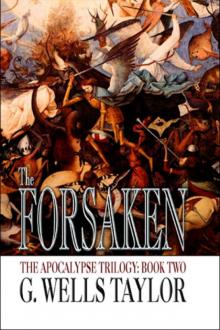- Home
- G. Wells Taylor
Dracula of the Apes 3 Page 2
Dracula of the Apes 3 Read online
Page 2
The big Texan feared mutiny or worse, but managed to calm his friends with his courageous demeanor, telling them to stick together come what may, and to follow his direction when the trouble came—because he knew it would come.
After a sleepless night, they’d watched through portholes as crewmen lowered a large lifeboat and commenced loading it with their possessions: bags, wooden crates and supplies, while distantly the African shore grew dark with the sun rising behind its greenery.
Soon after that, Mr. Manteau and four armed henchmen had ordered them out onto the deck where the other mutineers assembled near the Lancet’s portside railing. Seward had glared around the gathering of rogues before he growled a question about their skipper’s whereabouts.
A sneering mutineer had stepped toward the big Texan with a pistol raised and Seward felled him with a blow that would have stunned an ox. The ranger bellowed and charged at three of the closest seamen before they could react, sending two hurtling to the deck beneath the weight of his fists.
Van Resen and the others had leapt howling to his defense, but quickly found themselves overwhelmed. None of them had lived as rough and tumble a life as the good captain, who brawled on for some minutes after, giving a good account of himself against 15 brawny mutineers until some quick-thinking ruffian brought a hard belaying pin down on the Texan’s bull neck.
That staggered Seward enough for the tide to turn, and the poor ranger went down beneath a hail of bludgeons and sturdy rifle stocks.
There he had lain bleeding on the deck as Manteau ordered Van Resen and the others into the lifeboat.
“You got food, your gear, and a fighting chance,” Mr. Manteau had said. “I want your stuff off the ship in case we run afoul of the law.” He had young Lilly clamped tight in the pit of his filthy arm. “We’ll keep good care of your girls.”
Then had come the “leer” that provoked Van Resen and the others to muster for a final fight, but a stiff wall of thrashing rifle stocks met them at the Lancet’s rail and pushed them back into the lifeboat.
“Now, off with you!” Manteau released the girl to draw a knife, stepping forward to cut the line that tethered the launch to the steamship.
At that moment, Captain Seward leapt up to make his stand. Indeed, he was a terrible thing to see for he was covered with blood from head to toe, and in each fist he held a captured belaying pin that he used to batter any mutineer within reach.
Down went the devils who were closest to Lilly and Virginia, and a startled silence fell as the old ranger threw one woman after another over the Lancet’s rail and into the lifeboat. Lilly landed square in it, and Virginia struck the side with a splash as Van Resen and the others heaved her in.
The scientist had quickly grabbed up a paddle and encouraged Jacob to do the same on the side opposite so together they could start pulling feverishly for shore. As they advanced their breaths caught when sharp rocks scraped along the lifeboat’s keel, and submerged stones fouled their oars. But there was no time for worry.
Tears ran over all their faces as Seward fought the mutineers in the early morning light. On their own, the men would never have left him to this fate, but charged by the captain himself with the good ladies’ virtue, they had no choice but to push for the escape he had arranged.
The ranger fought to buy this freedom—and such a fight had none of the witnesses ever seen before. Impossibly, each time a mutinous gun was raised to fire at the lifeboat; the man holding it went down beneath a savage assault by the Texan.
Those within the lifeboat could not help but offer encouraging words. Saluting, they shouted their friendship across the waves, cheering the marvelous ranger on as he threw man after bloody man into the sea.
A drowned rock had thumped and the launch shuddered in the trough between waves. Then, just as the boat was lifted by the first swell of the surf, Seward assaulted the main group of mutineers gathered around Manteau. From within that living rampart the pig-faced man lifted a gun that belched a plume of smoke and a sharp report echoed across the waves.
Van Resen and the others cried out as Captain Seward staggered back. Then turning slightly to see that he’d bought his friends’ escape, he fell from the Lancet and sank beneath the waves with his tanned hands clasped over his mighty heart.
The scientist had shouted at his comrade then to pull with all his strength. “For we must not waste the efforts of our good friend!”
The lifeboat was caught up in the waves and driven through the surf toward shore.
At any moment, Van Resen had expected a hail of bullets, but none came—and then he thought a group of mutineers would follow to avenge their comrades or retrieve the women; but as the hull of the lifeboat ground against the sandy shore, Van Resen was free to clamber out with the other men and heave the boat up onto the beach.
While evacuating the women and Mr. Quarrie from the lifeboat, the scientist had been shocked to see the Lancet’s bow heaving west into the waves beneath a cloud of thick black smoke that churned desperately from its funnel.
The scientist had wondered then why Manteau had not followed, and thought to lay that marvel upon Seward’s efforts, too. Had the big Texan’s attack been so severe that Manteau lacked crew in sufficient health to attempt such risky things as reclaiming hostages—even pretty ones?
Van Resen had watched the ship steam away as he briefly considered an attempt to redeem the ranger’s body from the sea, but the reality of their situation was too severe.
There was no time for such luxuries as funerals.
And so with heavy hearts the castaways had started unloading the lifeboat, each thinking of the ranger, and wondering at the perilous future that he had purchased for them.
Then had come the ape’s screams.
“What shall we do, doctor?” Mr. Quarrie asked, limping over the sand toward him. The older man looked forlorn, glancing nervously between the jungle and the sea.
“Survive, sir,” Van Resen answered, rubbing his eyes as he shifted back from reverie. “As we must.”
Dr. Joseph Van Resen was an eminent biologist and scientist who had studied in his native Germany before taking research positions in Amsterdam and England. He had been lecturing at institutions in London when he was invited by the South African College in Cape Town to lecture on Charles Darwin’s work The Origin of Species.
“But how do we—survive?” Mr. Quarrie moaned, returning to his wife to dab at her cheeks with a damp handkerchief. She’d been growing paler since the last savage call had echoed from the jungle depths.
“Start with optimism. At least you weren’t traveling with White Star Lines,” Van Resen cracked. “Mind you, their crew is honest, and the luxury afforded you would make up for the dampness later experienced on the main deck.”
“You would joke about Titanic?” Miss James said harshly from where she had moved to fan Mrs. Quarrie’s face with her hands.
“Merely some levity intended to illustrate how lucky we are in comparison, Miss James,” Van Resen said, removing his eyeglasses to clean the lenses with his blood-stained and salt-encrusted shirt cuff.
He glanced up at tall, tufted trees that grew along the beach, and wondered which task would be more difficult: climbing them or opening the coconuts once they’d been retrieved.
“Marooned we may be,” he said, “but I see ample evidence of edible plant life which suggests potable water and animals that will suit our dietary requirements once we make some necessary adjustments.”
“Adjustments!” Miss James blurted, storming over to him. “We stand at the edge of a savage wilderness, and you speak of adjustments as though it is as simple as choosing coffee or tea.”
“Please remember, Miss James...” Van Resen slid his glasses back over his nose. “Our ancestors lived in places like this during prehistoric times and did quite well. If you can imagine them climbing up from this savage wilderness to sit eventually in a London tea room and make that choice between beverages... It’s quite encouraging don�
�t you think?”
He grinned without humor, catching her elbow and drawing her close to whisper, “My dear, I doubt we can expect rescue from a Carpathia of our own, and so we must make the best of what we have. Take a better attitude. Reality we must embrace, but your charges the dear Miss Lilly and her grandparents require your optimism if they are to make the ‘adjustments’ to which I have referred.” He gestured to the young girl who stood by the lifeboat with her arms crossed over her chest; her eyes were focused inward and her lips were quivering hopelessly.
“Oh, Lilly!” Miss James cried, and hurried over to the girl. The prospect of entering the jungle was priming the teenager’s every fear so her governess scolded herself for being drawn into Mrs. Quarrie’s histrionics—and the doctor’s philosophy.
Van Resen was correct: she had her duty and there was no room for pessimism if they wished to survive on this bleak shore.
She slipped her arms around Lilly’s shoulders and the sobbing girl buried her face against her breast.
“There, there, Ginny’s here,” Virginia cooed. “Let it out, my girl. You let it out.”
Van Resen looked at his companions and felt his own spirits flag momentarily as he thought again of the Texan. Captain Seward would have been very useful, indeed. Retired or not, his strength had still be in evidence as he’d fought the mutineers singlehandedly.
The big man had not even bothered to draw his gun.
Now gone and his body lost at sea. Such a shame. Van Resen resisted the urge to look back out over the waves.
That was the past, and the present would require his full attention if he and his companions hoped to enjoy any future.
Van Resen still fancied himself fit for vigorous exercise and the natural physicality that might lie ahead, but their party was sorely lacking in vigorous youth.
The Quarries’ butler Jacob Raines would be of use, and while the tall black man was old, he still exhibited a strong presence and upright frame in his black sack suit, bright waistcoat and starched collar. He was intelligent also, and had made good use of the associations and opportunities given a man in such employ.
According to Captain Seward, the gray-haired manservant had been born a slave 60 years before, and had started his life in service to his former masters when they were ranchers and now continued on after their becoming an oil family where he remained in his liberty with hopes of some security into his dotage.
Raines was hale and hearty nonetheless, though he had complained about the cold, damp weather of London.
Van Resen had no idea what to make of the man’s feelings about a trip to Africa, since he called America his home. The manservant would have to adapt like the rest of them. One look at the anxious expression on his lined and careworn face told the scientist that Raines had not imagined this turn of events.
Phillip Holmes was traveling alone and was young enough, if a trifle delicate looking in his fashionable garments. He’d been easily mastered by the mutineers, though he had had the pluck to raise a fist. One look at the pale flesh on his hands and Van Resen knew it would soon be flayed to the bone by the rigors of jungle living.
But adaptations could be made. That was how life worked.
“Look!” Lilly’s summery voice suddenly chimed, followed by a trilling giggle that brought the other castaways around to see the girl and her governess.
There in Lilly’s hands was Captain Seward’s broad-brimmed hat looking somewhat rumpled from rough usage—she had been hugging it to the breast of her scarlet jacket.
Van Resen smiled, knowing the hat must have been knocked into the lifeboat during the melee, and the girl had picked it up unconsciously for comfort, as a child might clutch a doll.
Lilly’s eyes passed over her companions and came to rest upon the hat in her hands.
Fresh tears fell over her soft cheeks as she thought of the captain.
CHAPTER 3 – Dark Moringa
Van Resen held a butcher knife and Jacob Raines hefted an axe as the pair left the shore in search of shelter. They moved inland along a natural sand and dirt path until the trees fell away on either side to form a roughly ovoid clearing about 100 yards across that swept east to a rise 150 yards from them.
The scientist had noted bird song and animal calls echoing through the high branches that started as individual voices and were soon joined by others to form a pleasant chorus that grew more riotous with each step the men took along the path.
Van Resen judged the somewhat distracting sounds to be a good sign, since it was unlikely to be business as usual for the avian life and smaller herbivorous animals if a large predator were near. That assumption then caused him to worry, since a link could be made between their previous silence and the roar of the ape that had earlier harried the beach.
Had it been a carnivorous anthropoid after all?
He was drawn from this distressing contemplation when Jacob gasped, brushed his arm and pointed. There almost center to the clearing and held aloft in a tight group of stunted trees, they could just make out the rough lines of what had to be a man-made structure.
“Remarkable,” Van Resen whispered.
It was covered and choked with creepers and parasitic ivy, and the wooden planks were weathered and green with moss in many places, but it looked very much like a hut had been built in the trees.
By its state and the overgrown surroundings, there could be little doubt that it had been abandoned.
“What luck, Jacob...” Van Resen said, turning to the Quarries’ man, but he saw that Raines was facing south, his interest set upon...
“Those trees, doctor. They aren’t right,” Jacob muttered, canting his head as he gestured with the axe. About 20 paces to the south where the land started to rise; the slope was overrun by tall dark-leafed trees of a species unknown to Van Resen.
“I know the leaf and the pattern on the bark, but the color...” He would need a sample for study so he hoped that the mutineers had included all of his possessions when they’d loaded the lifeboat. His was a journey of science and exploration, after all, and he had packed several books on African flora and fauna. He would search through the cargo at the first free moment and collect specimens later.
The grove hardly looked inviting, anyway.
“Could you go in among those trees?” Van Resen said, certain that he’d seen an amorphous black mist drifting by the tangled roots.
“In there?” Jacob scowled, pointing at the shadowed trunks. “Not likely—if it was a choice.” Then the black man frowned and turned to him. “Unless you’re ordering me, sir, and if that’s the case, I’d best point out that I’m a free man employed by Mr. Quarrie to look after his kin.” His eyes darted toward the dark grove, and his fingers crept nervously along the haft of the axe. “Being lost with you all upon these shores, I am but one of the group so I must be asked if I’m to render any service.”
“Oh, I was speaking rhetorically, my good man, and meant no offense,” Van Resen blurted, moving close to take Jacob’s hand. “Forgive me.”
“Sure. I’m just saying...and to remind, I guess...” Jacob chewed his bottom lip before smiling. “Seems I have to do that every day back home in Texas, and here with the wild growing every which way, I don’t want anything to slip.”
Van Resen nodded respectfully as Jacob stepped away with the axe hugged tight to his chest, shivering as he leaned toward the dark trees.
“There’s fog or something in there, and a draft coming out—can you feel it?” The black man shook his head. “...and here in the heat!” He wrinkled his nose as Van Resen started forward. “Pah! They smell bad, too...”
“I’m almost certain of the genus and species of this plant,” Van Resen muttered, sliding his knife into his coat pocket as he moved past his companion and toward the dark wood. His hand came up and the fingertips traced the outer edge of the left lens of his eyeglasses.
The scientist scrutinized the blue-black leaves on the dark branches swaying over him and then he looked alon
g the limbs and trunk that were fleshy and marred with knobby protuberances over their purple, red-veined length.
At that range the cadaverous smell coming from between the tightly packed tree trunks was overpowering
“It’s unmistakable!” the scientist hissed. “Originally classified in India, it is a hardy vagabond capable of living everywhere by all accounts.” He reached up to grasp one of the large, greasy seedpods that hung from overhead but withdrew his hand suddenly. “How they came to be growing on the West African coast, I cannot say.” Van Resen half-turned to his companion and started speaking sharply as though he were reading from a book:
“Moringa, of the flowering plant family Moringaceae. This particular specimen undoubtedly has roots in the Moringa stenopetala variety known to Africa, affectionately called the ‘cabbage tree.’ I had no idea any grew this far west of Kenya—or that it grew this large. Of course, that could account for this grove’s unnatural and unhealthy appearance, which may be too subjective an observation since its appearance could be ‘normal’ if indeed we are looking at a new species or hybrid.” He sniffed the air. “Ordinarily moringa is prized as a plant of many healthy and nutritional qualities which makes me somewhat uncertain about this...perhaps it is diseased.” He rose on tiptoe to smell one of the large, dark-veined leaves. “Decay, certainly...”
“Are they dying?” Jacob said, stepping back.
“Ah—no!” Van Resen laughed, tapping the side of his nose. “I am reminded of the Amorphophallus titanum—the ‘carrion’ or ‘corpse flower’ that grows in the Sumatran rainforest. A flower known for its incredible size and stench, but prized by collectors. The blooms smell like rotten flesh, and yet, the purpose for their aroma could not be less sinister, for they emit this smell to attract scavenging insects that pollinate the flowers and ensure the future of the species.” He clapped his hands together. “This is splendid!”
“Don’t know about splendid...” Jacob drawled, running his hand under his nostrils.

 Dracula of the Apes 2
Dracula of the Apes 2 Dracula of the Apes 3
Dracula of the Apes 3 The Urn
The Urn Painkiller
Painkiller The Forsaken - The Apocalypse Trilogy: Book Two
The Forsaken - The Apocalypse Trilogy: Book Two When Graveyards Yawn
When Graveyards Yawn The Variant Effect: PAINKILLER
The Variant Effect: PAINKILLER When Graveyards Yawn ta-1
When Graveyards Yawn ta-1 Painkiller tve-2
Painkiller tve-2 The Variant Effect
The Variant Effect